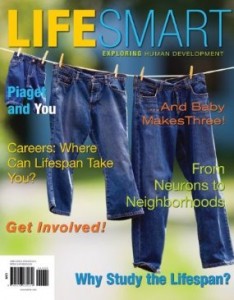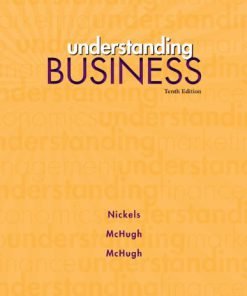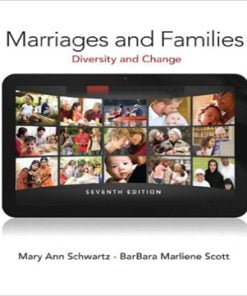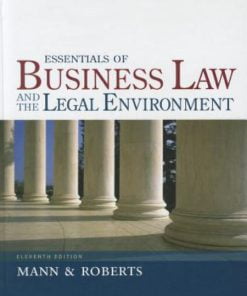Test Bank for LifeSmart, 1st Edition : Fiore
$35.00 Original price was: $35.00.$26.50Current price is: $26.50.
Test Bank for LifeSmart, 1st Edition : Fiore
Test Bank for LifeSmart, 1st Edition : Fiore

Product details:
- ISBN-10 : 9780078035241
- ISBN-13 : 978-0078035241
- Author: Lisa B. Fiore
Now, with our newest M-series program, LifeSmart: Exploring Human Development, you have the opportunity to engage your students as you never have before. LifeSmart’s adaptive diagnostic provides your students with the ability to assess what they know and don’t know before their tests. Furthermore, LifeSmart provides Milestones, our new video and assessment program that helps bring the course material to life, so your students can witness development as it unfolds. Our research gives students current and relevant applications to their lives in a new design layout that will grab your student’s attention and make serious scholarship enjoyable to read. LifeSmart fits today’s students.
Table contents:
1. Lifespan Development: An Introduction
a. An Example of Development through the Lifespan
b. Thinking about Lifespan Development
i. Why Study the Lifespan?
ii. What Is Development?
c. Changing Views of the Lifespan
i. Changing Perspectives on Aging
d. The Importance of Biopsychosocial Interactions
i. Understanding Children’s Cultures
ii. Contributors to Biopsychosocial Interactions
e. Issues in Lifespan Development
i. Continuity versus Discontinuity
ii. Nature versus Nurture
f. Research in Lifespan Development
i. Data Collection Techniques
ii. Time-Variable Designs
iii. Ethics
g. Conclusion & Summary
h. Key Terms
i. What Do You Think?
j. Chapter Review Test
2. Theories of Development: Interpreting the Lifespan
a. Theories of Development: Interpreting the Lifespan
b. Psychoanalytic Theories
i. Freud’s Theory
ii. Erikson’s Psychosocial Theory
iii. Contributions and Criticism of Psychoanalytic Theories
c. Cognitive Theories
i. Piaget’s Cognitive Developmental Theory
ii. Vygotsky’s Sociocultural Theory
iii. Contributions and Criticism of Cognitive Theories
d. The Behavioral Approach
i. Pavlov’s and Watson’s Classical Conditioning
ii. Skinner’s Operant Conditioning
iii. Bandura’s Social Cognitive Learning
iv. Contributions and Criticism of Behavioral Theories
e. A Bioecological Model
f. Developmental Theory: Current Status, Future Direction
i. Interactions among Levels of Development
ii. Developmental Systems Theory
iii. Unique Theories of Development
iv. From Neurons to Neighborhoods
g. Conclusion & Summary
h. Key Terms
i. For Review
j. Chapter Review Test
k. Chapter Objectives
3. Pregnancy and Prenatal Development
a. The Biological Basis of Development
b. Chromosomes, DNA, and Genes
i. Mitosis and Meiosis
c. Hereditary Disorders
i. Chromosomal Disorders
ii. Genetic Disorders
d. The Fertilization Process
i. Menstrual Cycle
ii. Egg
iii. Sperm
e. Multiples
f. Fertility: Challenges and Opportunities
i. Causes of Infertility
ii. Assisted Reproduction Techniques
iii. Adoption
g. Prenatal Development
i. Germinal Period
ii. Embryonic Period
iii. Fetal Period
h. Prenatal Testing
i. Ultrasound
ii. Amniocentesis
iii. Alpha-Fetoprotein (AFP) test
iv. Chorionic Villi Sampling (CVS)
i. Critical Interactions: Biology and the Environment
i. Nutrition and Exercise
ii. Emotions and Sense of Self
iii. Culture
iv. Teratogens
j. Infectious Diseases
i. Syphilis
ii. Toxoplasmosis
iii. Other Infections
iv. Rubella (German measles)
v. Cytomegalovirus (CMV)
vi. Genital Herpes
vii. HIV/AIDS
k. Prescription and Nonprescription Drugs
i. Illegal Drugs
ii. Smoking
iii. Alcohol
l. Conclusion & Summary
m. Key Terms
n. For Review
o. Chapter Review Test
p. Chapter Objectives
4. Birth and Newborn
a. Stages in the Birth Process
b. Methods of Childbirth
i. Natural Childbirth
ii. Midwives and Doulas
iii. Home Delivery
iv. Use of Medication
v. Cesarean Section
c. Complications and Interventions
i. Breech Birth
ii. Fetal Monitoring
iii. Use of Instruments
iv. Induced Labor
v. Oxygen Deprivation
vi. The Rh Factor
vii. Premature Birth
viii. Resilience and Prematurity
d. Characteristics of Neonates
i. Sensory Competence
ii. Neonatal Reflexes
iii. Neonatal Assessment Techniques
e. Postpartum Adjustment
i. Depression
ii. Bonding
iii. Single-Parent Families
iv. Family Dynamics
f. Conclusion & Summary
g. Key Terms
h. For Review
i. Chapter Review Test
5. Infancy
a. Physical Development in Infancy
i. Developmental Milestones of Infancy
ii. Nutrition
iii. Brain Development
iv. Motor Development
b. Neonatal Problems
i. Failure to Thrive
ii. Sudden Infant Death Syndrome (SIDS)
iii. Sleeping
iv. Respiratory Distress Syndrome
c. Perceptual Development
i. Visual Perception
ii. Depth Perception
iii. Auditory Perception
d. Cognitive Development
i. Piaget’s Sensorimotor Period
ii. Evaluation of Piaget
iii. Information Processing in Infancy
e. Language Development
i. The Pace of Language Acquisition
ii. Vygotsky’s Stages of Language Development
iii. Key Milestones of Language Development
f. Social and Emotional Development
i. Children’s Developing Relationships
ii. The Role of Reciprocal Interactions
iii. Role of Emotions in Development
iv. Analyzing Emotional Expression
g. Attachment
i. Examining Attachment
ii. Attachment Challenges
h. Temperament
i. The Dimensions of Temperament
ii. Kagan’s Biological Interpretation
iii. Chess and Thomas’s Classification of Temperament
i. Conclusion & Summary
j. Key Terms
k. For Review
l. Chapter Review Test
6. Early Childhood
a. Physical and Motor Development
i. Features of Physical Development
ii. Brain Development
iii. Growing Motor Skills
iv. Biopsychosocial Influences on Physical Development
b. Cognitive Development
i. Piaget’s Preoperational Period
ii. Vygotsky’s Theory
iii. Information-Processing Theory
iv. Theory of Mind
c. Early Childhood Education
i. Constructivist Approaches to Learning
ii. Head Start
d. Language Development
i. Language Rules
ii. Language Irregularities
e. The Self Emerges
i. The Development of Self
f. Social Development
i. The Role of the Family
ii. Parenting Styles
iii. The Role of Siblings
iv. Children of Divorce
v. Nonparental Child Care
g. Gender Development
i. Definition of Terms
ii. Theories of Gender Development
iii. Acquiring Gender Identity
iv. Gender Stereotyping
h. The Importance of Play
i. Kinds of Play
ii. Developmental Aspects of Play
iii. Play Materials
i. Children’s Artwork
j. Conclusion & Summary
k. Key Terms
l. For Review
m. Chapter Review Test
7. Middle Childhood
a. Physical Development
i. Brain Development
ii. Health and Nutrition
iii. Learning Disabilities
iv. Attention Disorders
b. Cognitive Development
i. Piaget and Concrete Operations
ii. Gardner and Multiple Intelligences
iii. Sternberg’s Triarchic Theory
iv. Intelligence Testing
c. Critical Thinking and Problem Solving
i. Problem Solving Strategies
ii. Obstacles to Successful Problem Solving
d. Moral Development
i. Piaget’s Explanation
ii. Kohlberg’s Theory
iii. Gilligan’s Ethics of Care
e. Language Development
i. Changes in Vocabulary
ii. Theories of Reading Acquisition
iii. The Issue of Literacy
iv. Bilingualism
f. The Changing Sense of Self
i. The Developing Self-Concept
ii. Self-Esteem and Competence
iii. Self-Regulation
g. Social Development
i. The Role of Family and Friends
ii. The Role of Schools
iii. The Role of Technology
h. Stress in Middle Childhood
i. Child Abuse
ii. Resilient Children
i. Conclusion & Summary
j. Key Terms
k. For Review
l. Chapter Review Test
8. Adolescence
a. What Is Adolescence and When Does It Start?
b. Physical Development
i. When Does Puberty Start?
ii. The Secular Trend
iii. Body Image and Eating Disorders
c. Cognitive Development
i. Variables in Cognitive Development: Piaget
ii. Emotions and Brain Development
iii. Adolescent Egocentrism
iv. Information Processing
v. Critical Thinking
d. Identity in Adolescence
i. Erikson’s Psychosocial Theory
ii. Marcia’s Identity Status
iii. Hill’s Biopsychosocial Theory
e. Social Development
i. The Role of Family
ii. The Role of Peers
f. Sexual Identity
i. Sexual Behavior
ii. Sexual Abuse
iii. Teenage Pregnancy
g. Mental Health Issues
i. Suicide
ii. Substance Abuse
iii. Stress
iv. Criminal Behavior
h. Conclusion & Summary
i. Key Terms
j. For Review
k. Chapter Review Test
9. Early Adulthood
a. Initiation into Adulthood
i. Emerging Adulthood in the United States
b. Physical Development
i. The Peak Is Reached
ii. Organ Reserve
iii. The Effect of Lifestyle on Health
iv. Rape and Sexual Harassment
c. Cognitive Development
i. Piaget and Early Adulthood
ii. Intellectual/Ethical Development
d. Gender and Sexuality
i. Aspects of Gender Role
ii. Male and Female Identity
iii. Evolutionary Psychology
iv. Androgyny
v. Sexual Behavior
vi. Sexually Transmitted Infections (STIs)
e. Social Development
i. Levinson’s Concept of Individuation
ii. Erikson’s Th
People also search:
LifeSmart
LifeSmart Fiore
LifeSmart Fiore 1st
LifeSmart Fiore 1st Test Bank
Test Bank for LifeSmart, 1st Edition : Fiore Download
Related products
Test Bank
Test Bank for Essentials of Business Law and the Legal Environment, 11th Edition: Richard A. Mann











